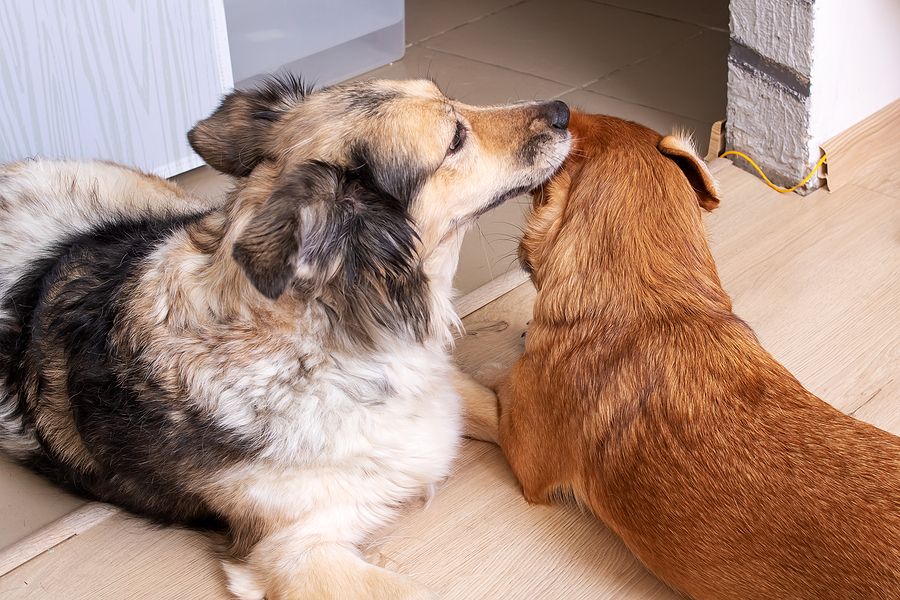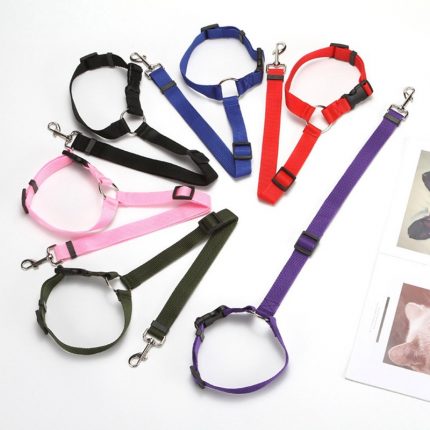Why Does My Dog Lick My Other Dog’s Eyes?
Dogs are known for their peculiar behaviors and habits, and one such behavior that often leaves pet owners puzzled is when a dog licks the eyes of another dog. While it may seem odd or even unhygienic to us humans, this behavior serves a purpose in the canine world. In this article, we will explore the reasons behind why dogs engage in this eye-licking behavior and what it signifies in their social interactions.
Firstly, it’s important to understand that dogs communicate through a combination of body language, vocalizations, and scent. Licking is a natural part of their communication repertoire, serving as a form of social bonding and interaction. When a dog licks another dog’s eyes, it can be seen as an expression of affection, trust, and submission. It is a way for dogs to reinforce their social hierarchy and strengthen their bond with one another.
Another reason why dogs may lick each other’s eyes is for grooming purposes. Dogs have a strong instinct to keep themselves and their pack members clean. By licking the eyes, they are helping to remove any dirt, debris, or irritants that may have accumulated. Additionally, the gentle licking motion can stimulate tear production, which helps to keep the eyes moist and healthy.

Furthermore, eye-licking behavior can also be a sign of empathy and comfort. Dogs are incredibly perceptive animals and can sense when their fellow canines are in distress or discomfort. By licking the eyes, they may be trying to provide relief or soothing to their companion. This behavior is often observed in dogs that have a close bond or have been raised together since puppyhood.
It’s important to note that not all dogs engage in eye-licking behavior, and it can vary from dog to dog based on their individual personalities and experiences. Some dogs may be more prone to licking, while others may not exhibit this behavior at all. If you notice excessive or persistent eye-licking that causes discomfort or irritation to your dogs, it is advisable to consult with a veterinarian to rule out any underlying health issues.
In conclusion, the act of a dog licking another dog’s eyes serves multiple purposes in their social dynamics. It is a way for dogs to communicate affection, establish hierarchy, groom one another, and provide comfort. While it may seem unusual to us, it is a natural behavior for dogs and should be understood within the context of their social interactions. By observing and understanding this behavior, we can gain further insight into the fascinating world of canine communication and strengthen our bond with our furry companions.
The Fascinating Behavior of Dogs Licking Each Other’s Eyes
Dogs are social creatures that have evolved complex communication systems to interact with each other. One such behavior that often raises eyebrows among dog owners is when one dog licks the eyes of another. This seemingly strange behavior serves several purposes and can be attributed to various factors. Let’s delve into the reasons behind why dogs engage in this eye-licking behavior.
Social Bonding and Affection
Licking is a natural form of social bonding among dogs. When a dog licks another dog’s eyes, it can be seen as a display of affection and trust. This behavior is often observed in dogs that have a close bond or share a strong social hierarchy. By licking the eyes, dogs are reinforcing their social connection and maintaining a harmonious relationship within their pack.
Grooming and Hygiene
Dogs are naturally inclined to keep themselves and their pack members clean. Licking is a grooming behavior that helps dogs maintain their hygiene. When a dog licks another dog’s eyes, it can help remove dirt, debris, or irritants that may have accumulated in the eye area. Additionally, the gentle licking motion can stimulate tear production, which aids in keeping the eyes moist and healthy.
Empathy and Comfort
Dogs are remarkably empathetic creatures and can sense when their fellow canines are in distress or discomfort. Eye-licking behavior can be a sign of empathy and an attempt to provide comfort to a companion. Dogs may lick each other’s eyes to soothe any irritation or discomfort, offering a sense of relief and support. This behavior is commonly observed in dogs that have a strong emotional bond or have been raised together since puppyhood.
Observing Individual Differences
It’s crucial to recognize that not all dogs engage in eye-licking behavior, and the frequency may vary among individuals. Some dogs may have a predisposition to licking, while others may not exhibit this behavior at all. Factors such as breed, personality, and past experiences can influence a dog’s inclination to lick another dog’s eyes. Understanding and respecting these individual differences can help foster positive interactions among dogs.
Health Considerations
While eye-licking behavior is generally harmless, it is essential to monitor the frequency and intensity of the licking. Excessive or persistent eye-licking can potentially indicate underlying health issues, such as eye infections, allergies, or irritations. If you notice any signs of discomfort, redness, or excessive tearing in your dogs’ eyes, it is advisable to consult with a veterinarian for a proper diagnosis and treatment.
Conclusions
In conclusion, understanding the behavior of dogs, such as why one dog may lick another dog’s eyes, can be crucial for pet owners seeking to ensure the well-being and harmony of their furry family members. For a deeper dive into this behavior and its meanings, visit geepets.com where you’ll find a comprehensive guide on “Why Does My Dog Lick My Other Dog’s Eyes” among other insightful articles on dog care and behavior.
Additionally, for further reading and resources on dog health and behavior, The American Kennel Club (AKC) offers a wealth of information. Whether you’re looking to understand the nuances of canine interaction or seeking advice on a wide range of dog-related topics, these resources can provide valuable insights and practical tips to help you foster a loving and understanding relationship with your pets.

Practical Recommendations for Managing Eye-Licking Behavior in Dogs
1. Monitor and Assess the Frequency
It is essential to observe and assess the frequency of eye-licking behavior in your dogs. While occasional licking is normal, excessive or persistent licking may indicate an underlying issue. Keep track of how often your dogs engage in this behavior to determine if it is within a healthy range.
2. Regular Veterinary Check-ups
Schedule regular veterinary check-ups for your dogs to ensure their overall health and well-being. A veterinarian can examine their eyes and rule out any underlying eye infections, allergies, or irritations that may be causing excessive eye-licking. Following their recommendations for treatment and management can help address any health-related concerns.
3. Maintain Good Eye Hygiene
To minimize the need for excessive eye-licking, it is crucial to maintain good eye hygiene for your dogs. Regularly clean their eyes with a veterinarian-approved eye wash or a damp cloth to remove any debris or irritants. This can help reduce the chances of eye-related issues that may trigger excessive licking.
4. Provide Alternative Forms of Affection
If you find yourself asking, “Why does my dog lick my other dog’s eyes?” and notice that this eye-licking behavior becomes excessive or bothersome, it is crucial to address this by providing alternative forms of affection and bonding opportunities for your dogs. To understand “Why does my dog lick my other dog’s eyes?” it’s helpful to recognize that dogs often exhibit this behavior as a form of grooming or showing affection, but when it becomes excessive, it might be time to intervene. Engaging in activities such as playtime, grooming sessions, or training exercises can help redirect their attention and reinforce positive behaviors, reducing the frequency of your query, “Why does my dog lick my other dog’s eyes?”
By offering these alternative engagements, you not only address the concern behind “Why does my dog lick my other dog’s eyes?” but also enhance the overall well-being and social skills of your dogs. These activities can serve as distractions and prevent the eye-licking from becoming a bothersome habit, thereby decreasing the occasions you find yourself pondering, “Why does my dog lick my other dog’s eyes?” Remember, while it’s important to curb unwanted behaviors, understanding the root of “Why does my dog lick my other dog’s eyes?” can also deepen your insight into your dogs’ social dynamics and emotional needs.
5. Separate Dogs if Necessary
In some cases, if the behavior of “Why Does My Dog Lick My Other Dog’s Eyes” becomes problematic or causes discomfort for one of the dogs involved, it may be necessary to separate them temporarily. This can help break the cycle of excessive licking, which is often questioned as “Why Does My Dog Lick My Other Dog’s Eyes,” and allow for a period of rest and healing.
Gradual reintroduction under supervision can be attempted once the behavior, encapsulated by the question “Why Does My Dog Lick My Other Dog’s Eyes,” has been addressed.
Addressing the concern behind “Why Does My Dog Lick My Other Dog’s Eyes” by identifying the root cause and managing the behavior appropriately is crucial for the well-being of both dogs involved.
6. Seek Professional Guidance
If the eye-licking behavior, often prompted by the question “Why does my dog lick my other dog’s eyes,” persists or becomes a concern, it is advisable to seek professional guidance from a certified dog behaviorist or trainer. They can assess the underlying causes behind “Why does my dog lick my other dog’s eyes,” provide tailored strategies, and offer training techniques to manage and modify the behavior effectively. Understanding “Why does my dog lick my other dog’s eyes” is crucial for addressing this behavior accurately.

A professional can help dissect the reasons behind “Why does my dog lick my other dog’s eyes,” ensuring that the approach to managing this behavior is based on the specific motivations and needs of your dog, thereby offering a resolution to the question and concern surrounding “Why does my dog lick my other dog’s eyes.”
7. Promote a Calm and Stress-Free Environment
Creating a calm and stress-free environment for your dogs can help alleviate any anxiety or tension that may contribute to excessive eye-licking. Provide them with a comfortable and safe space, establish consistent routines, and incorporate relaxation techniques such as soothing music or aromatherapy to promote a sense of tranquility.
Remember, each dog is unique, and what works for one may not work for another. It is important to approach the management of eye-licking behavior with patience, understanding, and a commitment to their overall well-being. By implementing these practical recommendations, you can help ensure a healthy and harmonious relationship among your canine companions.















